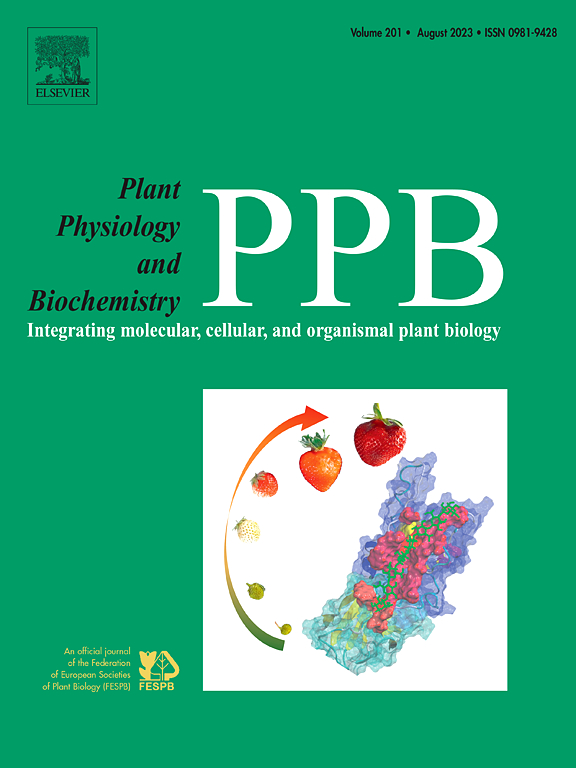Growth and physiological responses of wheat plants to polyphosphate and orthophosphate fertilizers supply under salt stress
IF 5.7
2区 生物学
Q1 PLANT SCIENCES
引用次数: 0
Abstract
Phosphorus (P) availability is significantly reduced under salt-stress conditions. Appropriate P fertilization can effectively alleviate its negative impact on plant growth and development. This study examines the impact of two P fertilizer forms (Ortho-B and Poly-B) on durum wheat tolerance to salinity (S1 = 3 dS m−1 and S2 = 6 dS m−1) under hydroponic conditions. A completely randomized design with six treatments and five replicates per treatment was used. At S2 salinity level, Poly-B outperformed Ortho-B (p < 0.05) by increasing shoot and root dry weights by 867 % and 127 %, respectively. It also improved root morphology (length, surface area, and crossings) by up to 353 %, enhanced chlorophyll content by 41 %, and raised shoot phosphorus content by 20 %, indicating superior stress resilience. These findings suggest that polyphosphate fertilizers are more effective in mitigating salt stress effects in wheat. Future long-term field studies are recommended to confirm these results and assess their agronomic applicability at scale.
盐胁迫下小麦对多磷酸盐和正磷酸盐的生长和生理响应
在盐胁迫条件下,磷(P)有效性显著降低。适当的施磷可以有效缓解其对植物生长发育的负面影响。本研究考察了水培条件下两种磷肥形式(orthoo - b和Poly-B)对硬粒小麦耐盐性(S1 = 3ds -1和S2 = 6ds -1)的影响。采用完全随机设计,6个处理,每个处理5个重复。在S2盐度水平下,Poly-B优于Ortho-B (p
本文章由计算机程序翻译,如有差异,请以英文原文为准。
求助全文
约1分钟内获得全文
求助全文
来源期刊
CiteScore
11.10
自引率
3.10%
发文量
410
审稿时长
33 days
期刊介绍:
Plant Physiology and Biochemistry publishes original theoretical, experimental and technical contributions in the various fields of plant physiology (biochemistry, physiology, structure, genetics, plant-microbe interactions, etc.) at diverse levels of integration (molecular, subcellular, cellular, organ, whole plant, environmental). Opinions expressed in the journal are the sole responsibility of the authors and publication does not imply the editors'' agreement.
Manuscripts describing molecular-genetic and/or gene expression data that are not integrated with biochemical analysis and/or actual measurements of plant physiological processes are not suitable for PPB. Also "Omics" studies (transcriptomics, proteomics, metabolomics, etc.) reporting descriptive analysis without an element of functional validation assays, will not be considered. Similarly, applied agronomic or phytochemical studies that generate no new, fundamental insights in plant physiological and/or biochemical processes are not suitable for publication in PPB.
Plant Physiology and Biochemistry publishes several types of articles: Reviews, Papers and Short Papers. Articles for Reviews are either invited by the editor or proposed by the authors for the editor''s prior agreement. Reviews should not exceed 40 typewritten pages and Short Papers no more than approximately 8 typewritten pages. The fundamental character of Plant Physiology and Biochemistry remains that of a journal for original results.

 求助内容:
求助内容: 应助结果提醒方式:
应助结果提醒方式:


